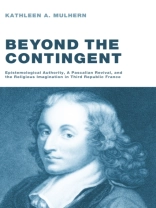In light of the contemporary struggle between science and faith, Kathleen Mulhern’s timely exploration of late nineteenth-century neo-Pascalian thought both recovers a lost perspective on the ‘war between science and religion’ and offers a fruitful angle of study for twenty-first-century reflection.
As the science vs. religion rancor reached its early fury at the turn of the century, many devout French Catholic intellectuals struggled with the increasingly dogmatic spirit in both the Roman Catholic Church and the scientific community. The dominant ideology of scientism within the intellectual establishment of the Third Republic (1870-1940) collided with a growing authoritarianism within the Church, expressed in the 1893 papal encyclical, Providentissimus. Physicist Pierre Duhem, philosopher Maurice Blondel, and priest Lucien Laberthonniere rejected the Roman Catholic Church’s Thomistic methodology and sought intellectual inspiration instead in the philosophy of seventeenth-century scientist, mathematician, philosopher, and Christian apologist Blaise Pascal.
These neo-Pascalians offered an alternative to the adversarial relationship between modern culture and orthodox Catholic faith, but their ideas came to an abrupt and bitter conclusion when they ran afoul of Church authority. The narrative and contribution of the neo-Pascalians offers many insights and lessons that could helpfully inform the contemporary debates surrounding the dialogue between science and religion.
关于作者
Kathleen Mulhern is an historian, writer, educator, and the Managing Editor at Patheos.com. She has taught at Regis University and Colorado School of Mines, and currently teaches Church History at Denver Seminary. She holds an M.A. in French Literature, an M.A. in Church History, and a Ph.D. in History.







![的封面 Brian Schrag & Julisa Rowe: Community Arts for God's Purposes [Chinese] 貼近神心意的社群藝術 的封面 Brian Schrag & Julisa Rowe: Community Arts for God's Purposes [Chinese] 貼近神心意的社群藝術](https://static.worldofdigitals.com/thumb_webp/740/9781645083740.webp)




